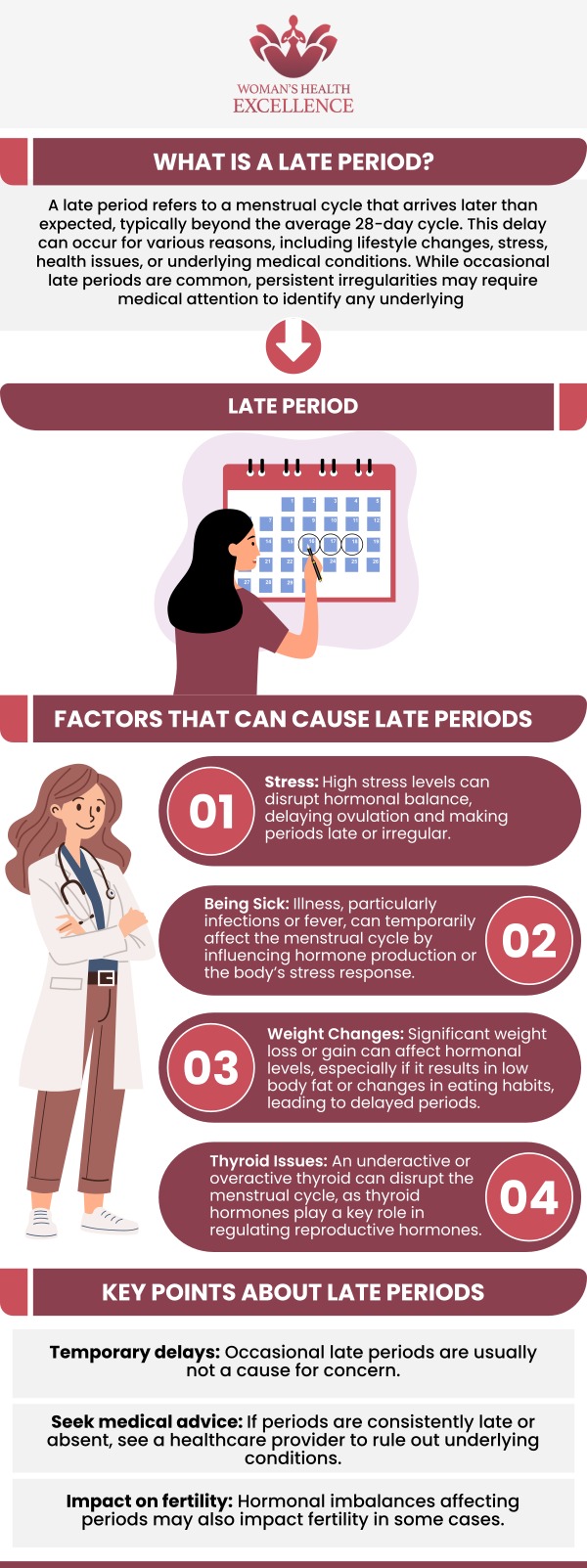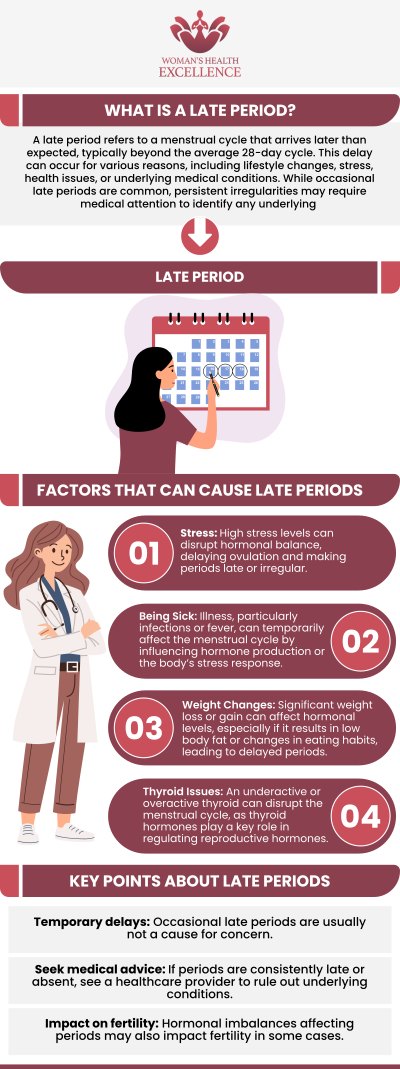Why Is My Period Late If the Pregnancy Test Is Negative?
A negative pregnancy test alongside a late period can be worrisome. Various factors, including stress, changes in weight, or certain prescription medications, can cause a delayed period. It’s essential to consult a healthcare provider to identify any potential underlying medical issues. Dr. Prema Kothandaraman at The OB-GYN & Incontinence Center offers comprehensive women’s health services, including diagnosis and treatment for menstrual irregularities. For more information, contact us today or book an appointment online. Our clinics are located in Arcadia, CA, and Glendale, CA.




Table of Contents:
What are common reasons for a late period with a negative pregnancy test?
Can stress cause a late period and a negative pregnancy test?
How does hormonal imbalance affect your menstrual cycle?
Can early perimenopause cause period delays?
At The OB-Gyn & Incontinence Center, we understand that having a late period coupled with a negative pregnancy test can be a source of confusion and concern for many women. While pregnancy is frequently the first thought that comes to mind when a period is late, there are several other potential reasons for this occurrence.
Hormonal imbalances are among the most prevalent causes of irregular menstrual cycles and can occur naturally or due to certain conditions like Polycystic Ovary Syndrome (PCOS), thyroid disorders, or Cushing’s Syndrome. Our expert team of gynecologists has extensive experience diagnosing and treating these disorders, helping to restore regular menstrual cycles and alleviate any associated symptoms.
Stress and lifestyle factors can disrupt the hormonal balance that regulates your menstrual cycle. Significant changes in weight, intense physical activity, and high levels of emotional stress can all lead to late periods. Our center offers treatments and lifestyle guidance to help manage these factors.
Certain prescription medications and health conditions can have an impact on your menstrual cycle. Our team can provide an evaluation and work with you to manage any medications or conditions that may be contributing to late periods. This includes hormonal birth control, antidepressants, antipsychotics, and conditions such as diabetes, celiac disease, ovarian cysts, or uterine fibroids.
Rare conditions like premature menopause or an early pregnancy loss can sometimes cause a late period, even with a negative pregnancy test. If you have reason to believe you may be pregnant or are experiencing symptoms like pelvic pain or heavy bleeding, it’s advisable to consult with our healthcare professionals for further evaluation and testing.
Stress can lead to a late period, even if a pregnancy test comes back negative. High-stress levels can throw off the hormonal balance that regulates the menstrual cycle, particularly affecting cortisol levels, commonly known as the “stress hormone.” Elevated cortisol can interfere with the normal production of estrogen and progesterone, which are essential for regular ovulation and menstruation. When ovulation is delayed due to stress, it can result in a late or missed period, sometimes mimicking early pregnancy symptoms like fatigue or mood swings.
A negative pregnancy test during this time can be confusing, especially if you’re experiencing these symptoms. Pregnancy tests identify the hormone hCG which is only produced if you’re pregnant. If stress is the reason behind your delayed cycle, no hCG is present, leading to a negative test result.
To help regulate your cycle, try incorporating stress-reducing activities, or regular exercise, as these can help balance cortisol levels. Maintaining a consistent sleep schedule and a balanced diet also supports hormonal health. If irregular cycles persist, it’s wise to consult a healthcare provider, as they can check for other possible causes. Managing stress not only aids in maintaining a regular cycle but also supports your overall well-being.
At The OB-Gyn & Incontinence Center, we understand the crucial role hormones play in maintaining a regular and healthy menstrual cycle. Our team of healthcare providers has considerable experience in dealing with hormonal imbalances that can lead to menstrual cycle irregularities and complications such as heavy or extended periods, lighter or missed periods, and conception difficulties.
We assess and manage conditions that are often related to hormonal imbalances, like polycystic ovary syndrome (PCOS), which is characterized by high levels of androgens or male hormones, leading to infrequent or prolonged menstrual periods. Our team is also adept at recognizing and treating thyroid-related complications, which can affect the regularity and intensity of your periods.
We fully recognize that stress and lifestyle factors significantly contribute to hormonal imbalances. Therefore, our services extend beyond medical treatments, as we also provide lifestyle advice tailored to each patient’s needs. This advice may include nutrition counseling, exercise recommendations, and guidance on managing stress levels to ensure a balanced hormonal environment.
Our goal at The OB-Gyn & Incontinence Center is to assist you attain overall hormonal balance rather than merely treat symptoms. We believe that this approach is key to ensuring a regular and healthy menstrual cycle, reducing the risk of fertility problems, and promoting overall well-being. If you suspect a hormonal imbalance, we encourage you to seek advice from our specialized team. We are committed to providing effective treatments and managing symptoms to help you maintain or regain a healthy, balanced menstrual cycle.
At The OB-Gyn & Incontinence Center, we understand that changes in your menstrual cycle can be a cause for concern. Early perimenopause, which is the phase leading up to menopause, can indeed cause these changes. This period can begin as early as the mid-30s and is often characterized by fluctuations in menstrual cycles, including period delays.
As experts in women’s health, we are well-versed in the signs and symptoms of early perimenopause. These can range from longer or shorter cycles, to heavier or lighter bleeding, and missed periods due to the fluctuating levels of estrogen and progesterone. It’s not uncommon for women in this phase to experience delays in their periods of several days or even weeks.
It’s significant to realize, though, that not all changes in your menstrual cycle are caused by perimenopause. Other factors such as pregnancy, stress, significant weight loss or gain, hormonal imbalances, structural abnormalities in the uterus or cervix, certain medications, and conditions like polycystic ovary syndrome (PCOS) or thyroid disorders can all affect your cycle. If you notice any changes, we recommend you consult with one of our experienced healthcare providers to determine the cause and discuss possible treatments or lifestyle modifications.
In addition to period delays, early perimenopause can bring about other symptoms such as hot flashes, night sweats, sleep disturbances, fatigue, mood swings, vaginal dryness, and decreased fertility. Options for treatment range from lifestyle modifications to prescription medications and hormone therapy.
The OB-Gyn & Incontinence Center recognizes that each woman’s experience with perimenopause is unique. We are committed to maintaining open conversations with our patients to find the best approach for each individual. If you suspect you may be entering early perimenopause or have any concerns about your menstrual cycle, don’t hesitate to speak with us for assistance and guidance. For more information, contact us today or book an appointment online. Our clinics are located in Arcadia, CA, and Glendale, CA. We serve patients from Arcadia CA, Glendale CA, Monrovia CA, Pasadena CA, Los Angeles CA, Burbank CA and surrounding areas.


Additional Services You May Need
▸ Urogynecology
▸ Minimally Invasive Gynecology
▸ Monalisa & Medical Aesthetics
▸ Bioidentical Hormone Replacement Therapy
▸ Urinary Incontinence
▸ Pelvic Organ Prolapse
▸ Painful Bladder
▸ Urinary Tract Infection
▸ Genitourinary Syndrome of Menopause
▸ Female Sexual Dysfunction
▸ Urinary Retention
▸ Vaginal Laxity & Prolapse
▸ Postpartum Pelvic Floor Problems
▸ PCOD
▸ Bladder Prolapse Repair
▸ Urgent PC
▸ Fibroids
▸ Excessive Bleeding
▸ Pelvic Pain
▸ Birth Control & IUD
▸ Vaginal & Pelvic Infection
▸ Monalisa Touch
▸ STD
▸ TempsureVitalia
▸ Biote Pellet Therapy
▸ Topical BHRT
▸ Flexsure
▸ Rectal Prolapse Repair
▸ Tempsure ENVI
▸ Minimally Invasive Pelvic Surgery for Incontinence



